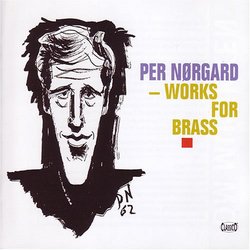Brass works from a good span of the composer's career, and f
Christopher Culver | 04/04/2009
(4 out of 5 stars)
"Classico has released several CDs with music by Per Norgard, but they remain obscure outside of Denmark. However, if you are a fan of the composer, you'll find this a well-made production, with excellent sound and an informative booklet.
Two pieces here come from the late part of Norgard's "psychadelic" period, when his music was increasingly based on the infinity series in its chromatic form and interference tones. "Musaic" for brass ensemble (1969) overlays independent renditions of the infinity series, making up one big work from many isolated pockets of sound. In "Backlight" for brass and chamber orchestra (1970) the orchestra plays flurries of infinity series fragments, while four trombones maintain long held notes. An effect of foreground and background emerges, and two trumpets and two tubas provide an intermediary role. Hallucinatory stuff. If you love works of this era like the Symphony No. 2, the wind quintet "Whirls World", or "Arcana", you find these two pieces much in the same vein.
In the mid-1970s Norgard derived a little melody from the infinity series that he thought appropriate for setting Ole Sarvig's poem "Aret" (The Year). This melody inspired a number of works, such as the open work "Winter Cantata", the virtuoso choral piece "Frostsalme", and the simple song for baritone and piano "Aret". In terms of brass works, he also wrote a Tuba Octet using this melody. On this disc, we don't hear the Tuba Octet alone, but rather the producers decided to have a choir sing the words to the melody after each brass movement, a creation dubbed "Now all the earth is white with snow". It's lovely, but of everything here it has the least depth or mystery, as it explores the concept of interference much less than in the bulk of Norgard's composition.
Then there are two brief fanfare-like pieces. "Massifs - Crystals - Cascades" for 12 trombones (2004) consists of three types of textures. You have a slow melody (massifs), rapidly pulsating note series (crystals) and falling overtone series (cascades). These are presented in isolation, before being united in a dizzying flurry. Norgard calls the "Fanfara Nervosa" for brass and percussion (1999) a nervous, indecisive shifting of moods and suggests it's a kind of backwards glance at his career. Indeed, this rather universal piece seems to relate to the soundworld of all the brass works here.
While I wouldn't recommend this as an introduction to Per Norgard (the Third Symphony usually does that), I do think this is a fine disc for fans of the composer. We're lucky that Amazon makes it readily available."


 Track Listings (9) - Disc #1
Track Listings (9) - Disc #1